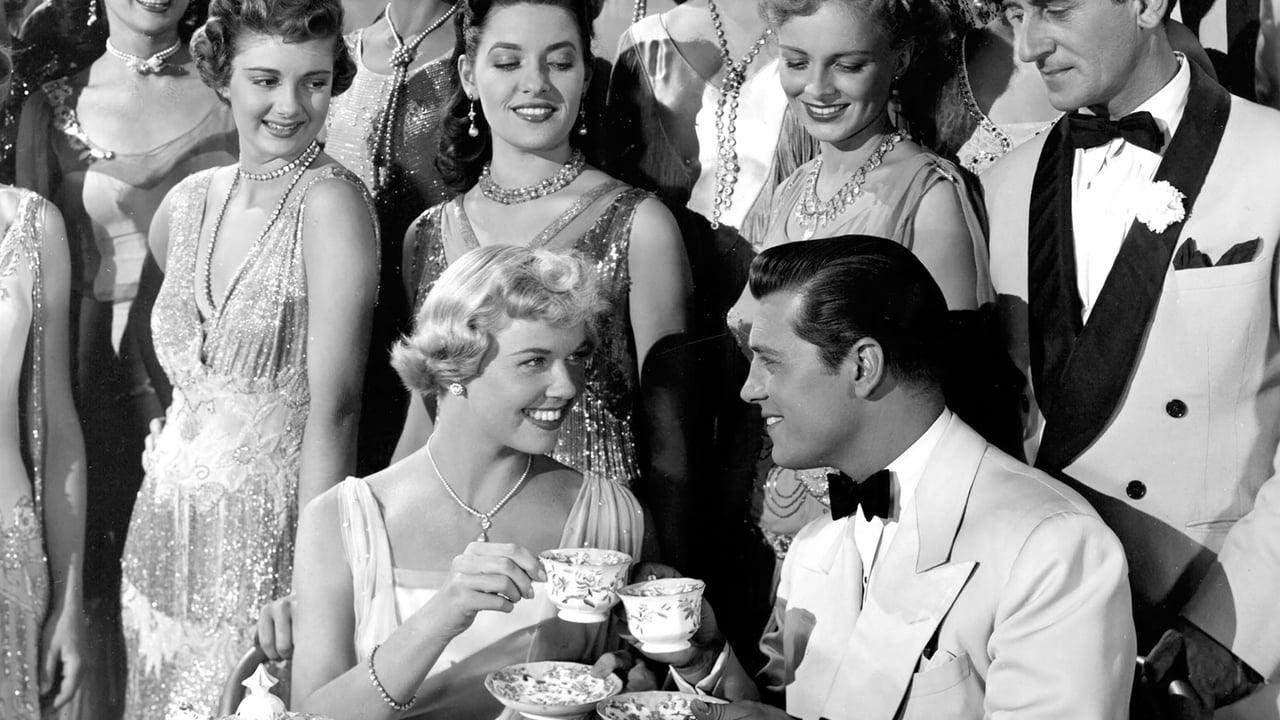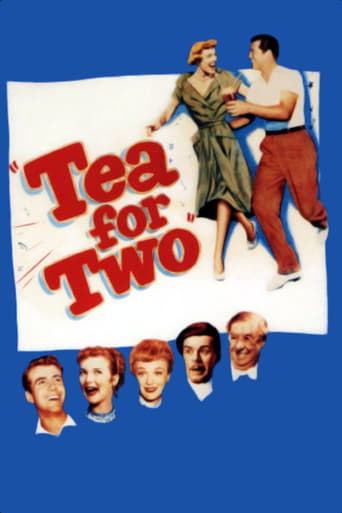Matrixston
Wow! Such a good movie.
Smartorhypo
Highly Overrated But Still Good
Odelecol
Pretty good movie overall. First half was nothing special but it got better as it went along.
Brendon Jones
It’s fine. It's literally the definition of a fine movie. You’ve seen it before, you know every beat and outcome before the characters even do. Only question is how much escapism you’re looking for.
writers_reign
There are several reasons why anyone would go and see this; 1) They're a Doris Day buff, 2) they're into Broadway Musicals transposed to film or 3) they like 'real' songs, the kind with catchy and/or soaring melodies and literate lyrics. If we need a fourth selling point how about some classic 'supporting' actors not least Eve Arden, but not forgetting Billy DeWolfe and S.Z. 'Cuddles' Sakall. The plot, such as it is turns out to be a thin re-working of the Broadway hit No, No, Nanette, so thin in fact that they could have given a writing credit to Nick Charles. It's kicked off by one of the most unrealistic 'flashbacks' in movie history - which is saying something - when Zackall, coming upon the children of Day and MCrae wearing their parents old clothes and performing the Charlston (a ploy, incidentally, lifted straight from Coward's Bittersweet) proceeds to tell them how it really was back in 1929. The flashback opens with himself, learning via ticker-tape that the money he invested on behalf of his niece, Nanette (Day) is worthless, then switching to Day rehearsing song and dance with Gene Nelson and Gordon McCrae, something of which Zackall could have no direct knowledge, and then blithely following them separately and/or in groups. Of course in 1950 no one cared about sloppiness like this even in drama let alone a musical so best ignore it and revel in the score which, though uneven/unbalanced culled as it is from several sources, remains a fine example of great songwriting.
theowinthrop
Before getting into the issues of musical score, cinematography, cast, direction, and storyline, one has to always bring in some baggage with "Tea For Two" (known on stage as "No No Nanette!"). Supposedly baseball team impresario and theatrical producer Harry Frazee, in an effort to raise the cash for a new musical with music by Vincent Youmans, sold his best player on the Boston Red Sox, George Herman "Babe" Ruth, to his friend Col. Ruppert of the New York Yankees, thus guaranteeing New York would dominate baseball for the next century while Boston came close but never got the gold ring (despite Ted Williams and others). Since the start of the present century Boston has won the World Series twice, whereas the Yankees have not won any. One can safely say the so-called "curse of the Bambino" is dead. But I wish to add, you may hate Frazee as much as you want for trading Ruth and several other great players to New York. But the money went into other productions he was pushing, not "No No Nanette." The musical came about four years after the stupid trade of Ruth. So this is not a case of Boston's loss was the gain of Vincent Youmans fans.The musical has been remade three times, with this version in 1950, starring Doris Day, Gordon MacRae, Eve Arden, Gene Nelson, S.Z. Sakall, and Billy De Wolfe. The 1950 version, re-entitled "Tea For Two", was directed by David Butler, and is considered the best of the three. It does contain the big two hits by Youmans from the show ("Tea for Two" and "I Want to be Happy"), but it also has tunes by the Gershwins and others, including Harry Warren and Al Dubin (this is a Warners Brothers film, and they got full use of tunes like "I Only Have Eyes For You!").The production is very nice in terms of color film stock, and scenery (particularly a 1929 style mansion). But best is the acting - the cast is not only good, but as the material is good the cast does very well with it.Day is a stage struck heiress living with her Wall Street broker uncle Sakall. She was left a fortune by her father, but Sakall is her guardian and is in charge of the fortune. Unfortunately he invested the money (despite the advise of his lawyer Bill Goodwin) in stock instead of stable but small return government bonds. Comes the crash and Sakall has lost his money (although he still has much of potentially valuable stock) as well as all of Day's. The plot concerns how Day is being pursued by De Wolfe for financial assistance in floating his Broadway production of "No No Nanette". De Wolfe, in his career, frequently played unlikeable types - either sneering know-it-alls (wherein he was a younger "Clifton Webb" type, without Webb's actual wisdom), or semi-conman (like the minstrel performer in "Dixie" with Bing Crosby). Nobody likes De Wolfe (Day has already had some history with him and is waiting for him to repay a $10,000.00 loan). Even Sakall can't stand him. But he is the man heading the production. He is trying to get Day's backing, but trying to somehow convince his girlfriend/leading lady (Patrice Wymore) to give up the lead to Day. Wymore has history with the choreographer (Gene Nelson) but has thrown him over for De Wolfe (however she is increasingly regretting this error). Gordon MacRae is the songwriter on the show, and dislikes the lies De Wolfe spreads about his family's health and need for medical care - lies that De Wolfe uses to try to pry cash out of Day). MacRae also is falling for Day (and she certainly likes him). Through a complicated mistake Day agrees to a wager with Sakall: she will not answer any question with a "Yes" for 48 hours, and if she doesn't she will be given the $25,000.00 for the show. However, if she does say "Yes" she can't spend any money for one year. So the plot keeps following moments when Day has to disappoint people by denying any question (even when she plans the reverse). On the other hand, Sakall, knowing there is no money, tries again and again to get her to say "yes". At one point, when trying to make an appointment, Sakall's crazy wager works against him when the negative Day annoys a motorcycle cop who arrests them both.This plot may sound trite, but musical comedy plots were frequently like that in the 1920s. I may add that the crazy balancing act between Day and Wymore that De Wolff is forced to go through is funny, as is the typically cynical comments of Day's secretary and friend (Eve Arden) on the antics of the others, and belatedly her own attempts at romance.It actually works - a good musical which entertains, which is the purpose of most musicals. It's nice to recall that there was a time when our musical theater was welcomely naive and pleasant - not the musical of thought and discussion of the 1950s and 1960s - not the musical of the age of Sondheim, but only the musical of the age of Youmans, Gershwin, and Berlin.
wes-connors
This film peaks near its beginning with a production number featuring Doris Day and Gene Nelson dancing with both an infinity mirrored wall and the New York skyline showing outside (of some huge windows). The later production number, a blend of "No, No Nanette" and "Tea for Two", is tellingly anti-climatic.The plot is easy - Ms. Day has to say "No" to everything for a day. But, the movie goes on and on with several songs and dances having little/nothing to do with the story. Other characters and sub-plots are thrown in; with all the extra songs and dances, I have no trouble believing everything in this film was not in the original "No, No Nanette". Some of it all is very good - Day and MacRae sing well, Mr. Nelson dances well, and Eve Arden does her thing - but this feels more like a string of songs and scenes than a movie. ***** Tea for Two (9/1/50) David Butler ~ Doris Day, Gordon MacRae, Gene Nelson, Eve Arden
hfhfdfse
Doris Day (I mean the character she portrays) is trying to win over her uncle to sponsor a new Broadway show in which she is going to star. Needless to say that her uncle is less than happy about the prospect: he is sure that the show is going to be a failure and he is going to loose all his money. Doris bets him that she can reply "no" to every single one question she is asked within a 24 hour time frame. If she wins, he will have to give her the money she needs. Of course, this bet is followed by a series of funny situations. Some are brilliant, some are silly but still there is a lot to laugh at in this film. For example, when Doris is asked by a police officer "Do you know your name?", she says with dignity "No". Sure, it is not a masterpiece but some will find it very amusing. If there is no better prospect than spending a lonely evening at home, why not to watch Tea For Two. S z Sakall is very funny as uncle Max, Eve Arden who plays the secretary is very good, she's got the best lines in the film and says them in the way which Goldie Hawn would be proud of. Why did not she get the Best Supporting Actress Oscar?

